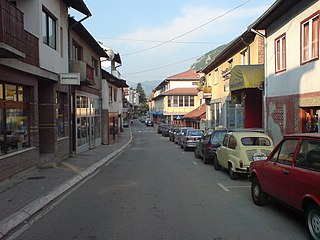
Unzha River, a river in the Vologda Oblast and Kostroma Oblast in Russia, a tributary of the Volga River. It is 426 kilometres (265 mi) long, and its basin covers 28,900 square kilometres (11,200 sq mi). The Unzha River begins at the confluence of the Kema River and the Lundonga River. It flows into the Unzhensky Cove of the Gorkovsky Reservoir. The Unzha River freezes up between October and December and stays under the ice until April or May. The main tributaries are the Viga, Neya, and the Mezha. The towns of Kologriv, Manturovo and Makaryev are along the Unzha River.

Perișoru is a commune in Călărași County, Romania. It is composed of three villages: Mărculești-Gară, Perișoru and Tudor Vladimirescu.

Vitasi is a village located in the Užice municipality of Serbia. In the 2002 census, the village had a population of 301.

Lesieniec is a village in the administrative district of Gmina Dłutów, within Pabianice County, Łódź Voivodeship, in central Poland. It lies approximately 5 kilometres (3 mi) east of Dłutów, 13 km (8 mi) south-east of Pabianice, and 26 km (16 mi) south of the regional capital Łódź.

Stefanów is a village in the administrative district of Gmina Gostynin, within Gostynin County, Masovian Voivodeship, in east-central Poland. It lies approximately 7 kilometres (4 mi) north-east of Gostynin and 102 km (63 mi) west of Warsaw.
Tchadoua is a village and rural commune in Niger.

Lug is a village in the municipality of Bajina Bašta, Serbia. According to the 2002 census, the village has a population of 2555 people.

Rača is a village in the municipality of Bajina Bašta, Serbia. According to the 2002 census, the village has a population of 672 people.

Ribarice is a village in the municipality of Loznica, Serbia. According to the 2002 census, the village has a population of 407 people.

Božetići is a village in the municipality of Nova Varoš, western Serbia. According to the 2002 census, the village has a population of 392 people.

Jasenovo is a village in the municipality of Nova Varoš, western Serbia. According to the 2002 census, the village has a population of 272 people.

Nosoljin is a village in the municipality of Raška, Serbia. According to the 2002 census, the village has a population of 260 people.

Vrtine is a village in the municipality of Raška, Serbia. According to the 2002 census, the village has a population of 117 people.

Banja is a village in the municipality of Priboj, Serbia. According to the 2002 census, the village has a population of 2163 people. It is the location of Banja Monastery.

Bučje is a village in the municipality of Priboj, Serbia. According to the 2002 census, the village has a population of 186 people.

Čitluk is a village in the municipality of Priboj, Serbia. According to the 2002 census, the village has a population of 195 people.

Jelača is a village in the municipality of Priboj, Serbia. According to the 2002 census, the village had a population of 254.
Kasidoli, Priboj is a village in the municipality of Priboj, Serbia. According to the 2002 census, the village has a population of 455 people.

Gračanica is a village in the municipality of Prijepolje, Serbia. According to the 2002 census, the village has a population of 199 people.

Zvijezd is a village in the municipality of Prijepolje, Serbia. According to the 2002 census, the village has a population of 104 people.








